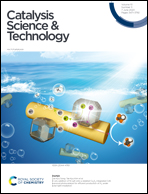Tuning the reactivity of molybdenum (oxy)carbide catalysts by the carburization degree: CO2 reduction and anisole hydrodeoxygenation†
Abstract
Molybdenum (oxy)carbide catalysts supported on activated carbon were prepared by a carbothermal hydrogen reduction method without passivation step. Four carburization temperatures (500 °C, 600 °C, 700 °C and 800 °C) were selected to control the catalyst carburization degree based on studies of catalyst precursor carburization process by TGA-MS and in situ XANES. Quasi in situ XRD, XAS and XPS revealed that two types of material were produced – molybdenum oxycarbide (500 °C and 600 °C) and molybdenum carbide (700 °C and 800 °C) catalysts. The oxycarbide catalysts are rich in Mo-oxide and Mo-oxycarbide species (MoO2 and MoOxCy) and the carbide catalysts rich in Mo-carbide species (α-MoC1−x and β-Mo2C) with a certain remaining oxygen atoms. The carbidic and oxophilic Mo sites in the catalysts were respectively probed by CO and N2O chemisorption. The structure–performance relationships of these catalysts in CO2 hydrogenation and anisole hydrodeoxygenation (HDO) were studied. For CO2 hydrogenation, the carbide catalysts were much active than the oxycarbide catalysts and CO was the main product in all the catalysts. In contrast, the oxycarbide and carbide catalysts displayed comparable activity towards anisole conversion and the main products shifted from a mixture of phenol and benzene to only benzene upon increasing the carburization temperature from 600 °C to 700 °C. These catalytic results demonstrate that the catalytic performance of molybdenum (oxy)carbide material can be effectively tuned by varying the carburization degree and such tuning effect depends on the nature of reactant molecules: the carbidic Mo sites in Mo-carbide species are associated with CO2 and anisole-to-benzene conversions, and the oxophilic Mo sites in Mo-oxycarbide species are related to anisole-to-phenol conversion.



 Please wait while we load your content...
Please wait while we load your content...